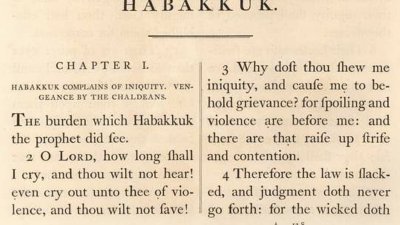This final paragraph is what living by faith looks like. This is what living by faith *sings* like. This is how trust in tension responds when it's about to get worse before the glory of the Lord covers the earth. This is living with *dissident joy* (dissident comes from *dis*=apart and *sedere*=to sit, so to sit apart), when we oppose the world’s official narrative in the peace of God which surprises their understanding.
These final verses of Habakkuk are often referenced at weddings; they have a "in sickness…in want…in sorrow” vibe. That said, the original context belongs to the economic devastation due to war. Some marriages are a battleground, but this has a bigger application.
The covenant people of Judah were corrupt, Habakkuk asked why the LORD seemed to be allowing it. The LORD said He was raising up a foreign nation to judge Judah, Habakkuk asked how it was right for the LORD to use such a wicked people. The LORD said He would judge them too, He purposed judgment for everyone who was puffed up. Habakkuk wrote a psalm as his reply.
The song started with Prophetic Requests in verse 2; Lord, *work*! Remember mercy! Verses 3-15 were Prophetic Remembrances, celebrating times when God showed up, through natural means and among the nations to do His work. Now the Prophetic Resolution comes in verses 16-19. It is the end of the song, and a fitting final paragraph to the book.
Habakkuk's resolution is a declaration of faith to rejoice amidst ruin.
# Reaction (verse 16)
The revelation of ruin *on Babylon* caused visceral reaction.
> I hear, and my body trembles;
> my lips quiver at the sound;
> rottenness enters into my bones;
> my legs tremble beneath me.
> Yet I will quietly wait for the day of trouble
> to come upon people who invade us.
> (Habakkuk 3:16 ESV)
This is full-body feedback, from head to feet, into the guts and skeleton. The **body** is more like the “belly” (KJV) or one’s insides; his “stomach churned” (NET), and **trembles** could be like "pounded." The **lips quiver** like a mouth-seizure making it hard to speak intelligibly. The **bones** are supposed to be the structure and support system, but they are being eaten away. **Legs** could be translated "feet" and they are wobbly, unsteady; he’s gone limp.
**I hear** follows up with “I have heard” in verse 2; Habakkuk got the message. And so he will **quietly wait for the day of trouble to come upon the people who invade us**. This isn't the catastrophe and captivity of Judah, this is the calamity on the Chaldeans. *That* trouble won't be the end of Judah's troubles, at least not immediately, it will be worse for everyone.
The body keeps the prophecy, so to speak, and who knows how long it will be while God’s judgment runs the course. When we see and fear and laugh (as in Psalm 52:8)—taunts included, we can’t skip the fear (where Habakkuk’s song started too in verse 2).
# Resolution (verses 17-18)
It's a resolution with concession: “Even though, still.” It’s all a piece, one sentence.
> Though the fig tree should not blossom,
> nor fruit be on the vines,
> the produce of the olive fail
> and the fields yield no food,
> the flock be cut off from the fold
> and there be no herd in the stalls,
> yet I will rejoice in the LORD;
> I will take joy in the God of my salvation.
> (Habakkuk 3:17–18 ESV)
Six lines of progressive collapse, disruption, and scarcity provide the context. There’s loss of options, luxuries, and essentials. Figs/dates were more sweet and like treats, fruit on the vine was grapes for wine. No olive oil and no wheat, then no baking and no bread. Now we're talking food basics not on the table. Without a flock there'd be no milk and little for sake of clothes, and no herd in the stalls meant no help for the work, and together no meat.
The land has been gutted, the supply chain broken. They didn't even have the Fed print worthless money to get these levels of inflation. The Chaldeans consumed the land and their own loans defaulted, now no one had the goods. This isn’t just a downturn or decline, it’s distress and devastation.
Verse 18 is the *single* resolution of the whole psalm (verses 1-19), said in two parallel ways to emphasize Habakkuk's faith. It’s a contrast, a “counterexpectation” (Kenneth Barker). When society crashes is when faith won’t crash.
He will **rejoice**. The reason will not be sight, it will be salvation. His hope is not in earthly goods but in God. **I will take joy**, “I will joy in” (KJV). “I will exult/triumph and I will shout in exultation.”
The integrated and comparative categories do work here. When we live by faith we do *not* ignore bread and wine, clothes and work. When we live by faith and God blesses us, our faith is integrated. We trust God for, and with, the stuff. If the stuff was bad, then Habakkuk’s rejoicing would be *because* of the losses not in spit of them. And yet comparatively, if we do not get the stuff, we are no less glad with God. Both hunger and plenty, abundance and need are tests, but rejoicing in God belongs with both.
The song helps the rejoicing, the corporate nature of the singing helps the rejoicing. Also, declaring the resolution to rejoice helps the resolve and the rejoicing. When the trouble burdens us, so much so that the body is wasting away, the inward man is renewed in his resolve to rejoice day by day.
# Recognition (verse 19)
Here is strength not just in potential but in practice.
> GOD, the Lord, is my strength;
> he makes my feet like the deer’s;
> he makes me tread on my high places.
>
> To the choirmaster: with stringed instruments.
> (Habakkuk 3:19 ESV)
Note that **GOD** is all caps in the ESV, and **the Lord** is lowercase "ord" unlike verse 18. It's *Yahweh Adonai* in Hebrew, which the NASB turns into "Lord GOD" and the NIV makes "The Sovereign LORD." Names for God are many, and all of them good for us to know. This pulls us into remembrance of His covenant/promise=Yahweh, His office/position=Lord, and His work/power=strength. He is “my salvation” (verse 18) and **my strength**.
The final two lines of the song make the same point and show one way the strength works (an analogy found also in Psalm 18:32). **Feet of a deer** is the last image, why? Deer bound around, but with agility and stability. They are known for their ability to navigate difficult terrain without fear or failure and falling. They are sure-footed in places where it's hard to hold on. Being made to **tread on high places** means we can navigate uncertain and even dangerous ground.
# Conclusion
A few final things as we finish Habakkuk's burden.
The whole book is a framework of faith: See. Complain. Hear. Submit. Sing. Or the fuller version:
- see (the corruption and sin)
- complain (in prayer to the Lord)
- hear (His Word)
- submit (to His purposes for judgment and glory)
- sing (Psalms)
- together (under the direction of the choir director)
- all by faith
*This is living.*
By way of application, it doesn't hurt to see the LORD's instructions for the captives in Babylon.
> But seek the welfare of the city where I have sent you into exile, and pray to the LORD on its behalf, for in its welfare you will find your welfare. (Jeremiah 29:7)
We’re not burying our heads in the sand, the Ostrich Option. We’re not digging deeper bunkers to hide. When it’s bad, we do what we can, knowing that it could be better, and one day *will* be better when God’s glory is known on earth, and in that tension we trust Him to work.
In a world that is negative toward Christianity, we are guerrilla rejoicers, those who rejoice in our salvation as part of our resistance. "Take my stuff? Okay, you can't take my *joy*” (see Hebrews 10:34). A dissident opposes the official policy of anger and anxiety. In order to take joy in God we've got to have faith to "see" better from up where the deer run.
----------
## Charge
Rejoice in the Lord always, again I will say, rejoice. To exhort you to this again is no trouble to me and is safe to you. The LORD is your strength and your song. May the Lord renew your strength, and may He bless you with deer’s feet, ready to run and rejoice and not hold back.
## Benediction:
> [May you be] strengthened with all power, according to his glorious might, for all endurance and patience with joy; giving thanks to the Father, who has qualified you to share in the inheritance of the saints in light. (Colossians 1:11–12 ESV)






